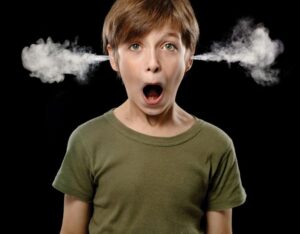As parents, we expect to deal with tantrums during the toddler years, but we are often less prepared when angry outbursts continue well into childhood. However, anger can actually be a symptom of anxiety in children.
Melinda Le, PhD, counseling psychologist at Le Psychological Services, LLC, says anxiety is one of the most common mental health disorders affecting children and adolescents. Temporary fears and anxieties are considered developmentally appropriate, however. “The physiological mechanisms are the same for anxiety and anger. Anxiety is a fear of the unknown. For children, any unfamiliar and stressful situation can be interpreted as a threat,” Dr. Le says.
Such threats trigger the body’s fight-or-flight response. Hearts beat faster, muscles tense up, blood flows away from the digestive system, and breathing quickens. “The physical symptoms of distress are uncomfortable,” Dr. Le says. “These symptoms are difficult for adults to manage, and in children, it can be even more confusing.”
Children react to fight-or-flight differently. Some respond by avoiding and clinging, others respond with irritability, tantrums and angry outbursts.
Learning to understand emotions like anxiety and dealing with them is part of growing up. “Caregivers can play a major role in helping children navigate their world,” Dr. Le says. “Patience, encouragement and support are needed.”
Modeling appropriate ways to handle emotions is an important way parents can help children develop emotional maturity. “How you deal with your own frustrations and distress will have an impact on how they respond to their distress,” Dr. Le says. “An important point to remember is that they are children. Children are new at managing their emotions. As they mature, they will become better at it.”
Dr. Le recommends reinforcing positive behaviors, validating feelings by listening without judgment, helping them find ways to self-soothe, teaching them relaxation techniques, and helping them use self-compassionate language.
“When children are provided with age-appropriate information and given clear expectations, they are better able to manage their distress,” Dr. Le says.
When you need support, Dr. Le recommends first speaking with your pediatrician to decipher what may be developmentally appropriate behavior and what may be more problematic. A mental health professional can help if difficulties are more serious.





